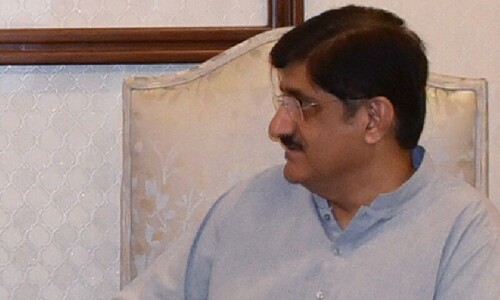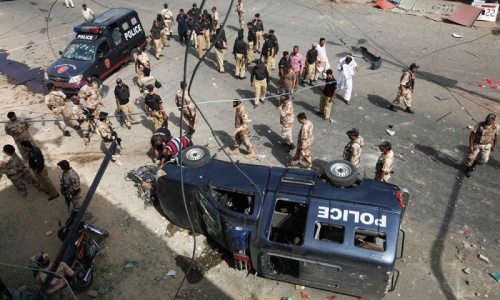Sindh Chief Minister-designate, Justice (Retd) Maqbool Baqar, underscored on Tuesday that the primary duty of a caretaker government upon taking office was to ensure elections were conducted in a timely and transparent manner.
“As I take on the role of head of the provincial government, the primary focus of the caretaker set-up will be to facilitate prompt elections, providing the Election Commission of Pakistan (ECP) with any necessary assistance they require for this purpose,” Baqar told Dawn News.
Baqar, a former judge of the Supreme Court, became the interim Sindh chief minister earlier today after Governor Kamran Tessori signed a summary for his appointment.
In a social media post on X (previously Twitter) in the early hours of the day, Tessori shared a picture of the summary sent to him by former Sindh chief minister Murad Ali Shah, which he had signed, thereby approving the latter’s advice.
The summary stated that after a “series of meetings” were held between Shah and the outgoing Leader of the Opposition in the now-dissolved Sindh Assembly, Rana Ansar, it had been agreed that Baqar would be designated the role of the caretaker chief minister.
It requested that Baqar’s notification for the role be approved under Article 224(1a) (time of election and by-election) of the Constitution.
Sharing the signed summary, Tessori stated: “I have signed the summary for appointing justice (retired) Maqbool Baqir as the caretaker chief minister. I have approved for justice (retired) Maqbool Baqir to be made Sindh province’s caretaker chief minister under Article 224 (1a) of the Constitution.”
MQM-P had confirmed a consensus was reached on the name of Baqar, whose name was primarily proposed by the treasury, and it was agreed upon by the opposition after a lengthy discussion within the party and with its allies.
Speaking with Dawn News today, Baqar underscored the significant responsibility that comes with holding public office, expressing his dedication to fulfilling it effectively.

When asked about the possibility of the caretaker government conducting an accountability drive, Baqar clarified that the assumption that his office would be solely accountable-focused was unfounded. “Such reports are not true.”
Nevertheless, he emphasised that a chief minister held the obligation to ensure all endeavours were conducted with integrity, encompassing both political and moral honesty. “While there’s no specific agenda to target individuals, corruption must be curbed in all forms.”
The former chief justice of the SHC asserted that he would never condone any form of misappropriation or corruption. “My entire approach is grounded in upholding the principles of law and justice.”
Responding to a query regarding the cooperation of provincial governments with accountability institutions, the CM-designate stated that any provincial government not aiding accountability bodies would be tantamount to negligence in duty.
Asked about his potential choices for members of the caretaker cabinet, Baqar noted that individuals in such positions would naturally desire individuals of integrity, dedication, and commitment who possess a genuine concern for the public’s welfare.
“I am earnestly desirous [of having such individuals], and with the support of people’s prayers, I remain hopeful that we can achieve this,” the former SHC CJ added.
Inquired about his approach in the event of election delays, Baqar stated that he had not received indications of such delays thus far. He, however, stressed that decisions regarding election scheduling fell under the purview of the ECP, emphasising that the caretaker government lacked the authority to make such determinations.
Before the formal announcement from any side, Justice Baqar, who retired from the Supreme Court last year, appeared on a private TV channel to confirm his appointment.
“I was first contacted from the treasury side and later the opposition also talked to me on this matter,” he said in response to a question.
The Sindh Assembly had been dissolved on August 11 after Tessori signed the summary forwarded to him by Shah for its dissolution, bringing an end to the PPP government in the province.
Who is Justice Baqar?
A law graduate from the University of Karachi, Justice Baqar retired from the Supreme Court last year and has served as the chief justice of the Sindh High Court as well.
According to the SHC’s website, he was enrolled there as an advocate in May 1981, after which he was elevated to the role of an additional judge on Aug 26, 2002.
Exactly a year later, Justice Baqar was confirmed as an SHC judge. On Sept 26, 2013, he was appointed as the chief justice before being elevated to the role of a Supreme Court justice on Feb 17, 2015.
Justice Baqar was also the target of a deadly bomb attack in June 2013, which killed nine people and injured 15 others, including Baqar, who was serving as a senior SHC judge at the time.
The attack had happened as Justice Maqbool Baqir drove past with his security detail on Burns Road. Police had said he was rushed to a nearby hospital with critical injuries and that his driver was killed in the attack.
Later, police had arrested Bashir Leghari who was suspected of being the mastermind behind the attack. He was said to belong to the “Asif chotu group” of the Lashkar-i-Jhangvi, a banned militant outfit.















































